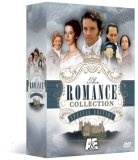| Reviews & Columns |
|
Reviews DVD TV on DVD Blu-ray 4K UHD International DVDs In Theaters Reviews by Studio Video Games Features Collector Series DVDs Easter Egg Database Interviews DVD Talk Radio Feature Articles Columns Anime Talk DVD Savant Horror DVDs The M.O.D. Squad Art House HD Talk Silent DVD
|
DVD Talk Forum |
|
|
| Resources |
|
DVD Price Search Customer Service #'s RCE Info Links |
|
Columns
|
|
|
Romance Collection: Special Ed. (Pride and Prejudice, The Scarlet Pimpernel, Emma, Tom Jones, Jane Eyre, Lorna Doone, Ivanhoe)
A&E has released a massive 14-disc, eight-movie set, The Romance Collection: Special Edition that should prove irresistible to fans of British TV period romances. The set includes 1995's Pride and Prejudice, 2001's Victoria & Albert, 1996's Emma (the version starring Kate Beckinsale), 1997's Jane Eyre, 2000's Lorna Doone, 1999's The Scarlet Pimpernel, 1997's The History of Tom Jones, a Foundling, and 1997's Ivanhoe. Clocking in at over thirty hours' worth of romantic misunderstandings, chivalrous gentleman, love-sick ladies, cads, bounders, catty gossipers, cock-sure swordsmen, damsels in distress, and dewy young maids and lads, The Romance Collection: Special Edition may be light on extras, but the overwhelming amount of material here makes it an attractive hammer-blow for swooning enthusiasts of these types of entertainments (of which I count myself a member in good standing). Let's look at the individual films.
PRIDE AND PREJUDICE
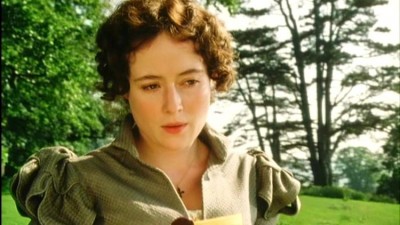
Mr. Bennet (Benjamin Whitrow), a country squire of relatively modest income and even more temperate disposition, has his hands full with five unmarried daughters and an exceedingly flighty, anxious wife (Alison Steadman) desperate to marry them off to men of good position and wealth. Therefore, the arrival of a monied young man, Mr. Charles Bingley (Crispin Bonham-Carter), who has rented a nearby estate, throws the Bennet household into a tizzy - all except for Elizabeth Bennet (Jennifer Ehle), Mr. Bennet's most serious-minded, intelligent - and kindly - daughter. Jane Bennet (Susannah Harker), the eldest and acknowledged as the most beautiful of the Bennet girls, is immediately put forth as a suitable candidate for marriage by the frequently ridiculous Mrs. Bennet, and certainly the beautiful English rose Jane makes quite an impression on the handsome, good-natured Bingley.
However, Charles' friend, the even wealthier Frizwilliam Darcy (Colin Firth) looks upon the potential match with the same amount of cold, proud, disdainful scorn that he directs towards everyone in the countryside. Contemptuous of the sometimes loud, ill-mannered country ways of the Bennets, Darcy proves to be an unyieldingly stern and unhappy presence - one that intrigues Elizabeth, but not enough to change her unfavorable opinion of the stuffy Darcy. A chance encounter with militiaman George Wickham (Adrian Lukis) confirms Elizabeth's suspicions of Darcy, whom Wickham brands a bounder who has greatly wronged him. Admitting that she likes Wickham, Elizabeth can't say the same thing for pompous sycophant cousin Mr. Collins (David Bamber), who sets his sights on marrying Elizabeth. Rejecting his proposal (he promptly turns to a friend of Elizabeth's and successfully bags her), Elizabeth will eventually visit her cousin and his new bride at the estate of Lady Catherine de Bourgh (Barbara Leigh-Hunt), the benefactor of Mr. Collins. Lady Catherine also happens to be Darcy's aunt, who looks upon Elizabeth suspiciously since Darcy is promised to her daughter. An out-of-left-field proposal by Darcy (and a fairly pompous and callous one, at that) leaves Elizabeth fuming (she rejects it), but tragic family circumstances will fatefully bring the two back together.
Directed by the talented British director Simon Langton (1987's The Whistle Blower, TV's Smiley's People, Jeeves and Wooster), and fashioned from Jane Austen's novel by Britain's seemingly one-man period adaptation machine Andrew Davies (Middlemarch, Emma, Vanity Fair, Bleak House and many more), Pride and Prejudice starts off The Romance Collection: Special Edition on the very highest note, delivering a sumptuous, stirring version of Austen's beloved masterpiece. Garnering massive ratings in England and the U.S. when it played in 1995 and 1996, Pride and Prejudice has been the acknowledged template for other producers trying their hands at British period pieces, reaching a level of accomplished scripting, directing, acting and production design that few others have come close to replicating.
Quite a few devotees of Austen's work - and they are numerous and fierce - claim this version is the definitive cinematic representation of the author, and I'm inclined to agree with them. Of course, many newer viewers reference the popular, award-winning 2005 theatrical version starring Keira Knightley, while older viewers still look back fondly on the 1940 Hollywood version with Greer Garson and Laurence Olivier, or the previous BBC version from 1980 with Desmond Adams and Elizabeth Garvie. But I find this 1995 version an almost perfect amalgamation of Austen's surprisingly robust plotting and her subtle comedy of manners among the (largely) self-centered country gentry. Specifically, this Pride and Prejudice moves, despite the almost five-hour running time. Langton and Davies don't fall into the trap of many other British period minis that just let the actors move around the historic locations, hoping for verisimilitude but usually achieving calcification. Despite the period details, and of course the specific restrictions of the social mores of the times, these characters seem like they could be home in a contemporary drama - which of course is why Austen is still read today.
The energy of Pride and Prejudice, however, isn't frenzied; this isn't a souped-up, modernized version with pandering anachronisms designed to appeal to a more broad-based modern audience. The reserve that's necessary for Austen's plot mechanisms to work still dominates (after all, if everybody just came out and said what they really thought and felt, the novel would have been twenty pages long), and to its great credit, this version of Pride and Prejudice has a superlative assembly of actors perfectly in tune with Austen's sly (and subversive) wit, filtered through traditional British constraint. Evidently, Colin Firth caused something of a minor frenzy in England with his portrayal of Darcy (his wet shirt moment is noted as a milestone of sorts with fans of this genre), and while I can't speak authoritatively on his unique appeal, I'm told (by my fluttering wife) that he's "the goods" when it comes to a smoldering, romantic hero. I can attest to the appeal of Jennifer Ehle as the incandescently beautiful Lizzie; it's a terrifically difficult tightrope she has to walk as the conflicted, headstrong Elizabeth, and Ehle does it effortlessly. Special mention really must go out, as well, to Alison Steadman and Benjamin Whitrow for creating a comedy duo that gets boffo laughs in every one of their hilarious scenes together.
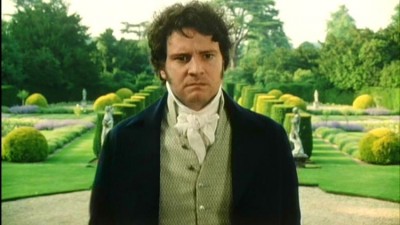
Alone among the releases on The Romance Collection: Special Edition set, Pride and Prejudice comes in a fair-to-good anamorphically enhanced widescreen transfer, which beautifully captures the elaborate, rather startlingly accurate production design (by Gerry Scott). Often times, these kinds of period pieces can come off either too sparse or too self-consciously "period" in their location work and set decoration. Pride and Prejudice, however, has the look and feel of a big-screen effort, with an intriguing combination of sumptuous reveling in the expensive-looking locations and costuming, married to largely realistic lighting and cinematography scheme. Watching Pride and Prejudice right out of the gate in The Romance Collection: Special Edition box sets the bar almost impossibly high for the remaining films.
VICTORIA & ALBERT
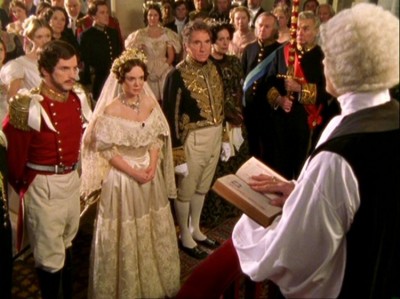
Looking at the passionate love affair between Queen Victoria and her husband Prince Albert, Victoria & Albert is a relatively chilly exploration of their 21-year marriage. If you remember your college European history classes, Queen Victoria (Victoria Hamilton), the niece of William IV, ascended the throne in June of 1837, at the age of only 18. The year before, she had met future husband, Prince Albert (Jonathan Firth) of Saxe Coburg and Gotha, who happened to be her first cousin. It would take three years and one more meeting for Victoria to recognize Albert as an attractive consort, and she married the German prince in 1840, and thus started a sometimes rocky relationship where both partners had to find out how they could stay married within the rigid restrictions set upon them by the monarchy. It proved, ultimately, to be an extremely successful marriage, fulfilling both Victoria and Albert emotionally and politically, while producing nine offspring until Albert's early death in 1861. Victoria, devastated by the loss, wore black the rest of her life, and largely retreated from the world, though she reigned for another forty years on the throne.
Directed by longtime American TV movie and series director John Erman and written by British screenwriter John Goldsmith, Victoria & Albert is an episodic examination of this famous marriage, filled with references to historical figures and events that may seem stale and dry to the average viewer not immersed in Victorian history. A lot of ground is covered in this two disc miniseries, including the rather harrowing relationship Victoria shared with her grasping, controlling mother Princess Mary Louise Victoria, the Duchess of Kent (who, due to constrained finances, viewed Victoria's eventual marriage as a financial arrangement, with no consideration of her daughter's happiness). This tense, unhappy relationship is offset by the Victoria's love for her governess, the Baroness Lehzen (Diana Rigg, who's excellent here), who provides the maternal care that Victoria so obviously craves.
Victoria & Albert is quite good at detailing the shifting loyalties demanded by the restrictions of Victoria's and Albert's separate roles within the monarchies, and how those loyalties affected personal relationships. Lehzen, who seems to have a hold over Victoria that no one can break, is eventually let go at Albert's insistence, once Albert starts to exert more and more influence (evidently for the good, according to the film) over Victoria. Equally intriguing is the depiction of Victoria's complex relationship with her Prime Minister, Lord Melbourne (Nigel Hawthorne), who serves as both political confident and close personal friend (and, according to some accounts, perhaps chaste lover or father figure). Hawthorne is such an accomplished performer that he effortlessly steals every scene he's in, so he's sorely missed when he departs in the second disc.Equally compelling is the central theme of Victoria & Albert: the restrictions of duty that Victoria and Albert face as both try to reconcile a traditional marriage when the woman is an absolute ruler. Quite a bit of Victoria & Albert details Albert's searching for an identity and a purpose in the face of being married to a woman who is his social superior, but unfortunately, as with much of Victoria & Albert, the interesting themes brought up by the screenplay are negated by a cool, distanced treatment. Victoria & Albert is, in a word, glacial in its tone, stately when it should be passionate, and pedantic when it needs to move. The material is there; the themes of compromise within an extraordinary marriage, the clash of Albert's German culture with a British public suspicious of his origins, and the various political intrigues that swirled around the couple, conspiring to separate them, would seem to be enough grist for three films. And Victoria & Albert touches on all of them...from a distance. The acting is fine (if a tad remote from the two leads), particularly from Rigg and Hawthorne, but a distinct lack of juice, of energy, mars the film's potential, making Victoria & Albert ultimately come off like a dull set of historical signposts instead of an integrated historical drama. Tech credits are fine (if somewhat claustrophobic in the production design), but what Victoria & Albert needed was an involved, not respectful, reading.
EMMA
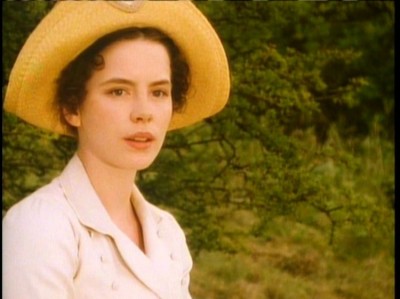
A good-looking but miscast (or perhaps performance-misdirected) version of Jane Austen's satirical novel, Emma tells the story of Emma Woodhouse (Kate Beckinsale), a spoiled, immature troublemaker who wants to play matchmaker with her friends to alleviate the boredom of her existence at home, and in her sleepy, provincial village. Believing that she was responsible for the wedding of her governess Miss Taylor (Samantha Bond) to Mr. Weston (James Hazeldine), Emma next turns her nosey sights on her friend Harriet Smith (Samantha Morton), who, although fond of young farmer Mr. Martin (Alistari Petrie), is persuaded by Emma to turn down his marriage proposal and concentrate on Mr. Elton (Dominic Rowan), the town's vicar. However, Mr. Elton reveals that all the attention paid to him by Emma and Harriet has made him fall in love with Emma, not Harriet, who offers no social position nor money for the class-conscious Mr. Elton. Emma's long-time friend, the stern, moral Mr. Knightley (Mark Strong), had warned Emma about meddling, and now sternly rebukes her actions - a condemnation that inspires Emma to interfere more, not less.
Two new arrivals in town - Frank Churchill (Raymond Coulthard), the stepson of Mr. Weston, and Jane Fairfax (Olivia Williams), the cultured, demure, lovely niece of well-meaning magpie Mrs. Bates (Prunella Scales) - sets off in Emma a particularly cruel streak of intervening that will have consequences for everyone involved. Churchill, a handsome but arrogant young man, seems to take delight in subtly making fun of the country people who entertain him, while fostering rumors about Jane's romantic past and playing cruel games of teasing at Jane's expense. Churchill's behavior brings out the worst in Emma, who shares a dislike of the more accomplished Jane. Machinations abound as Emma digs herself in deeper and deeper with her convoluted interfering, until she finds out the real truth about Jane and Frank, and her feelings for Mr. Knightley.
Released the same year as the buzz-worthy theatrical version starring Gwyneth Paltrow, Emma is a well-directed version of the popular Austen comic satire, with flashes of wit in director Diarmuid Lawrence's slow-motion dream sequences where Emma imagines the melodramatic outcomes of her romantic deceptions. Period details are correct, and there's obviously careful thought and time put into making this adaptation worthy of the high regard in which the novel is held. However, my main concern with this fast-paced adaptation of Emma is that it's not very funny, when the novel is one of Austen's most humorous. Whether it's Andrew Davies' rather literal, condensed script, or Lawrence's square interpretation of it as the source of this deadening of the comedy, it's difficult to say. Perhaps the trouble lies in the casting - or the direction of that cast. Certainly what I noticed right away was Beckinsale's rather bitchy, snotty portrayal of Emma, which varied little until the final denouement. The most distinguishing characteristic of Emma in the novel is her callow youth, which goes a long way towards explaining her romantic follies. But Beckinsale plays Emma as a knowing little hustler who derives enjoyment from interfering with others (her scenes with Frank Churchill best illustrate this), which seems to overshadow the nicer qualities of the character. I have no love for Paltrow as an actress, but at least she got Emma's sunny side, her essential lightness which goes a long way towards the audience eventually pulling for her - a lightness that utterly eludes Beckinsale.
As well, Mark Strong's interpretation of Mr. Knightley seems far too stern and cross and humorless for what is supposed to be a comedy of manners. And it's not as if the intent of the characterization was to satirize such a stiff, pompous bore by making him so unyielding - Emma seems to take this version of Mr. Knightley exactly as he's essayed. It's almost as if Strong's Knightley was from another book, more Dickens than Austen. It's a curious choice for the character, and one that further eliminates what should be, ultimately, a humorous experience. For that matter, the other performances seem strangely toned, as well. The lovely Olivia Williams seems perfect for the wan, accomplished Jane, but we're never really made to believe she would take back Frank, particularly when Churchill is played so icily by Frank Churchill. As well, his final transformation is none too believable in this context, either, because the performance has been so one-sidedly evil in intent. This version of Emma isn't without its pluses (the location work is excellent; the period detail considerable), but it's a curious way to make a comedy.
JANE EYRE
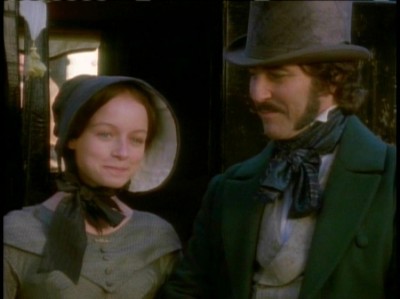
Yet another adaptation of the beloved Charlotte Bronte novel, Jane Eyre stars Samantha Morton as Jane, the independent, moral young girl from a good family who is sent to a harsh, puritanical boarding school where she endures many hardships - including the horrible death by typhoid of her best friend - before she masters the rules of the institution and becomes one of its teachers. Resolving to leave Lowood School for a career (rather than a prison sentence which seems more apt for Lowood), Jane advertises herself as a governess for hire, and is promptly hired by Alice Fairfax (Gemma Jones), the housekeeper of imposing Thornfield Manor. Her duties consist of teaching and shepherding Adele Varnes (Timia Berthome), the young French ward of her employer, Edward Rochester (Ciaran Hinds).
Despite a strained first meeting (where Jane is unaware that the rude man who has fallen off his horse is her employer), Rochester warms to Jane almost immediately - despite his gruff, angry demeanor, as Jane finds herself falling in love, too. The two share many long walks and discussions, but only after Rochester brings back to Thornfield a beautiful rival for Jane, and in turn, Jane leaves Thornfield for a month to visit her sick aunt, do the lovers finally profess their devotion and become engaged. A terrible secret of Rochester's, though, dooms the marriage, and Jane must decide whether or not she can set aside Rochester's deceptions in order to trust him again.
SPOILERS ALERT!
Certainly the best thing going for this 1997 adaptation of Jane Eyre is the remarkably calm yet inwardly passionate central performance of Jane by the remarkable Samantha Morton. There have been almost twenty notable adaptations of this venerable story, and I've always been partial to the 1970 TV version (which later played in theatres) starring George C. Scott and Susannah York. But I have to admit that Morton surpasses York (who was a tad too old to play Jane) with a shaded interpretation of the character that's quite remarkable in its delicacy and strength. Bronte's famous character is a layered compilation of themes revolving around social inequities (Jane first viewing herself as unequal to Rochester due to her lowly position), her sex (obviously at this time, women were considered inferior and subject to pressing constraints on their individual freedom of expression), and her steadfast moral core beliefs (she'll marry Rochester, but not when she realizes he lied to her about his insane wife, locked away in the attic). It's a difficult role to essay without falling into the trap of a standard Gothic heroine, running around sets, alternating swooning after the blustering Rochester or hiding in terror from his mad wife. But Morton embodies these themes effortlessly in her subtle performance, giving this Jane Eyre a strength of moral action I've haven't seen in other adaptations.
I can't say I was as pleased with Hinds' interpretation of Rochester, which felt altogether too rushed and...out of control for lack of a better descriptive phrase. His Rochester seems far too "on the edge" in all his dealings, far too high-strung for the Rochester I always have in mind, coming off many times as hysterical (and making Jane seem far more practical and centered). It doesn't help, either, that much telescoping of the story occurs in the fast-paced script, with Rochester one minute welcoming Jane to Thornfield and in the very next scene, asking her if he's handsome. It's a jarring juxtaposition, made necessary no doubt by time constraints, but it has the effect of making Rochester seem far more flighty, more careening in his emotions. As well, director Robert Young indulges in moments of Gothic fancy that play poorly against Morton's measure performance (the slow-mo introduction of Rochester on horseback, with Morton goggling her eyes comically, is a real howler). But overall - and directly because of Morton's excellent performance - this Jane Eyre is well worth revisiting.
LORNA DOONE
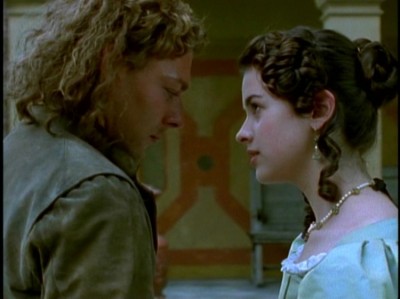
Probably the first adaptation in The Romance Collection: Special Edition set that your boyfriend or husband won't mind watching along with you, Lorna Doone is a fast-paced, action-packed version of the venerable Richard Doddridge Blackmore novel. Blackmore's exciting tale is set in 1675 in Exmoor in Devon, England. The Duke of Monmouth (the illegitimate son of recently deceased King Charles II) is mounting a challenge to James, Charles' brother, for the throne of England. The Duke has many sympathizers among the Protestant rural farmers of Devon, particular the thuggish Doone clan, who rule Doone Valley with brutal methods of rape, thievery, and murder. An aristocratic clan headed by Sir Ensor Doone (Peter Vaughan), the Doones have been relocated to the Doone Valley after having been evicted from their ancestral lands. Hoping to regain their home, the Doones side with Monmouth in his challenge of the lawful king of England.
Caught in the middle of this squabble is John Ridd (Richard Coyle), the son of a farmer killed during a Doone raid of his village. Swearing eternal vengeance on the Doones, John complicates matters by falling in love with Lorna Doone (Amelia Warner), the granddaughter of Sir Ensor, and the key to his plan in regaining the Doones' ancestral homes. As part of that plan, Lorna has been promised to Carver Doone (Aidan Gillen), a vicious killer who was the gunman behind John's father's death. As the Crown, in the form of Judge Jeffreys (Michael Kitchen), becomes aware of the Doones' reign of terror (as well as their potential to unseat the rightful king when they side with Monmouth), military man Jeremy Stickles (Martin Clunes) is dispatched to aid John in defeating the Doones. But that isn't easily accomplished when Lorna's secret heritage is revealed.
SPOILERS ALERT!
A rousing adaptation by screenwriter Adrian Hodges and director Mike Barker, Lorna Doone keeps the action flying as the story moves from one fight to the next, with a sweeping visual design, excellent location work, and particularly good performances, to boot. Lorna Doone is one of those titles that most people have heard about, but few have actually read (I vaguely remember paging through it during a summer vacation years and years ago), so I would imagine cinematic adaptations of the novel (and there have been many) don't suffer the same kind of scrutiny of say, the Austen novels in this collection, with their fervent admirers who chew over every shading and nuance. I can't vouch for Lorna Doone's fidelity to the original source material, but I can say it's a fairly impressive production with a familiar, but fast-moving story.
What I enjoyed most about Lorna Doone was the willingness of the production to get down in the mud and muck and create an earthy, violent romance. The fluttering ladies and gentlemen of the Austen works are nowhere to be found here - a nice tonic after the first four films in The Romance Collection: Special Edition set. Director Barker knows how to stage a battle scene, while keeping the characterizations clear, never leaving the audience stranded as to who's doing what to whom and more importantly, why. As well, Lorna Doone manages a not inconsiderable amount of grim wit to its proceedings, much of it from the Michael Kitchen Judge Jeffreys character, that's welcome amid the fighting and loving. The political subtext of Lorna Doone's story isn't ignored, and Kitchen's delightfully indifferent performance (on several occasions, he doesn't give a fig if our hero dies or not on his orders) goes a long way towards lightening the mood of the piece. Equally good is Peter Vaughan as Sir Ensor, whose quirky take on the gang leader character is vintage anti-hero Vaughan (it's a pity he's out of the story so early). I was most impressed with Coyle, as well. I'm used to seeing the funny Coyle in repeats of Coupling on BBC America, but he's quite good here in an action/romantic hero lead, and works well with the gorgeous Amelia Warner as the titled Lorna. If I have one major reservation about Lorna Doone, it's the character of Carver Doone, played well (but one-dimensionally) by Aidan Gillen. We never really get a sense of the dissipation and rot that sets into Carver once he loses Lorna, so his final showdown with John comes off as perfunctory rather than cathartic. Still, Lorna Doone provides plenty of brisk action amid attraction location work, with some amusing performances to help bring this classic tale to life.
THE SCARLET PIMPERNEL
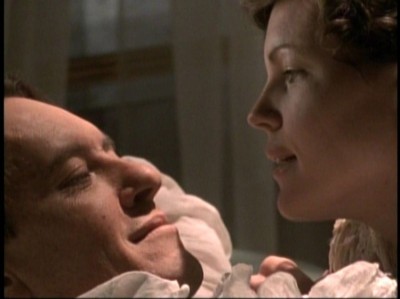
An utter delight! I had no recollection of this 1998 series of dramatizations of the marvelous Baroness Emmuska Orczy novels featuring that "damned elusive Pimpernel," the scourge of the French Reign of Terror and the savior of the doomed aristocracy. If you've never read any of the novels (then you should; they're marvelous), The Scarlet Pimpernel details the double life of one Sir Percy Blakeney (Richard E. Grant), a baronet and notorious English fop who is married to the French actress (and escapee of the Terror), Marguerite St. Just (Elizabeth McGovern). Estranged from his wife when he learns that she had given evidence against an enemy whose entire family was slaughtered by Robespierre (Ronan Vibert) and his gang of cutthroats, Sir Percy has reason to disdain the company of his French wife, for Sir Percy is also The Scarlet Pimpernel, the James Bond of the 18th century who pulls off seemingly impossible rescues of endangered noblemen and women who face certain death at the hands of the Terror's guillotine.
When Marguerite is blackmailed by Citizen Paul Chauvelin (Martin Shaw) to return to France and give information regarding the Scarlet Pimpernel, Marguerite realizes too late that she's implicated her husband, who in turn realizes that Marguerite's earlier betrayal was not motivated by cruel intentions. Soon, they're both outwitting the murderous Chauvelin, who has been charged by Robespierre to capture the Pimpernel at all costs, escaping death at every turn even when Chauvelin discovers Sir Percy's secret identity.
What I've always loved about the Pimpernel character is how his sympathies lie entirely outside the vast majority of fictional characters' (and thus, their author's) political and cultural concerns. A royalist and defender of the aristocracy, Sir Percy is the epitome of the Anglo-Saxon knight in shining armor who enjoys insulting the French immensely, as well as putting on airs of an insufferable fop in order to live his monied, privileged life to its fullest. He's a deliberate attempt to champion almost everything other authors don't want their readers to like. Of course, Sir Percy as the Pimpernel is ultimately concerned with justice first and foremost; he believes that the Reign of Terror is as bad (or worse) than the injustices visited on the poor, but more importantly, he sees his role as savior of the nobility as an excuse to revel in his own wealth and privilege, as well as giving him the opportunity to fully exercise his considerable wit, his cunning, and his various arts of war. It's a fascinating character that goes against the grain of every liberal tendency in most literature - and it's all the more welcome for that minority voice.
Richard E. Grant, one of my favorite actors, was born to play the notorious fop Sir Percy, but I was more than pleasantly surprised at his facility in playing the deadly Scarlet Pimpernel. Grant has the character's complexities down pat. If you're familiar with Grant's work, then of course you know he's more than capable of delivering Sir Percy's devastatingly funny put-downs of the French and anyone else who bores him to tears. When Grant, washing up after embracing his stinky friend Arturo, says, "Always remember the difference between the Latin and the Anglo-Saxon: the Latin believes civilization is wine and women; the Anglo-Saxon knows it to be soap," it's just one of many such hilariously devastating put-downs that Grant, sneering with his nose ever-so-slightly elevated, delivers to perfection.
However, his essaying of the Pimpernel persona is uniquely his, as well. Far from coming off as a lightweight playing at being a hero, Grant is all grave, steely determination as the crusading Pimpernel, displaying a convincing splash of derring-do in his action scenes that puts him right up there with the greats in the genre, including Flynn, Powers and Lancaster. It's a remarkable performance over the three episodes included here (The Scarlet Pimpernel, Madame Guillotine, and The King's Ransom), matched quite nicely by the always delightful Elizabeth McGovern as Marguerite. I wouldn't have thought of McGovern to portray the resourceful Marguerite, but she has such a range of expression behind those beautiful, sad eyes of hers, that I can't think of a better incarnation of the character (McGovern should have had a much bigger career than many of her more famous, but less-talented, peers). Together, Grant and McGovern are a dream team, conveying an old-time romantic (and highly sexual) chemistry that fits perfectly with the material.
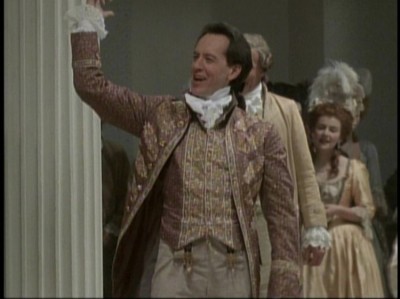
Shot in the Czech Republic on marvelous old castles and sets, The Scarlet Pimpernel looks as good as it sounds with razor sharp direction by Patrick Lau (for the first two episodes) and Edward Bennett, and tightly woven scripts by Richard Carpenter. Location work is first-rate, and the supporting players are excellent, with Martin Shaw as Chauvelin and Ronan Vibert as Robespierre making stand-out villains for the elusive Pimpernel to thwart. Along with Pride and Prejudice, The Scarlet Pimpernel is the stand-out entry in The Romance Collection: Special Edition set.
THE HISTORY OF TOM JONES, A FOUNDLING
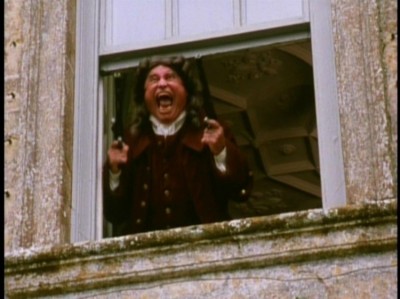
At times a very entertaining retelling of the infamous Henry Fielding novel, The History of Tom Jones, A Foundling has the time to include much more of Fielding's plot and social commentary than the award-winning 1963 feature film starring Albert Finney did, but what The History of Tom Jones, A Foundling critically lacks is a central performance equal to the scope of this TV miniseries. A brief rundown of Fielding's complicated romantic comedy has foundling Tom Jones arriving at the house of Squire Allworthy (Benjamin Whitrow). Brought up to be a rowdy hellion, Tom (Max Beesley) proves to be a delight to his neighbor Squire Western (Brian Blessed), who revels in Tom's whoring and mischief (while Squire Allworthy, convinced of Tom's essential goodness of character, patently waits for him to grow up). Tom's latest escapade, where he's suspected of impregnating local peasant Molly Seagrim (Rachel Scorgie) amuses Squire Western, until he finds out that his daughter Sophia (Samantha Morton) harbors romantic feelings towards Tom - which Tom returns.
Squire Western, enraged that his monied, landed daughter would wish to marry an untitled bastard, utterly rejects the suspected union, and seeks to rid his daughter of Tom's influence. He's aided by the efforts of Mr. Blifil (James D'Arcy), a supercilious, cold nephew of Allworthy's who wishes to have his estate - and Sophia - for himself. Taking advantage of Allworthy's near death, he manipulates the facts to cast doubt on Tom's love for Allworthy, who recovers and sends Tom away. As well, Blifil has burned an important letter sent by Allworthy's now-deceased sister that will provide earthshattering news for Tom and Sophia and everyone else, when its contents are later uncovered - but only after Tom has endured many hardships along the road to growing up.
There's much to The History of Tom Jones, A Foundling that's exactly right, such as the supporting cast - particularly Benjamin Whitrow as Allworthy and Brian Blessed as Western. Whitrow, who was so calm and sardonically funny in Pride and Prejudice, is equally measured as the appropriately monikered Allworthy, while Blessed is absolutely, insanely inspired as the frequently drunk, and more frequently enraged Squire Western. Blessed, his enormous head often stretched to the breaking point as he screams in fury, can often be found literally hopping up in down in animated delight during his scenes. It's one of the funniest performances I've seen in quite some time, and he steals each and every scene he's in; he was born to play this role. As well, the talented, lovely Samantha Morton (so good in the earlier Jane Eyre) is hysterically funny whenever she starts screaming at her maid, just like her father. It's a delightful, unexpectedly funny performance by the young beauty.
But what leaves The History of Tom Jones, A Foundling hollow in the middle is the performance of Max Beasley as Tom. Beasley, whom I enjoyed very much in the slick, entertaining Hotel Babylon series, is here, ten years before that series, very much a novice actor whose character demands more skill than the performer can deliver. No one can forget Albert Finney in the 1963 effort, but even leaving aside any comparisons, Beasley forgets the very essential part of Jones' character: this is a wild boy who enjoys every opportunity open to him: women, wine, hunting, fighting. Beasley, however, is far too resigned and low-key, almost totally negating the wild nature of Tom in favor of a rather dull, dim portrayal. Where's the energy we need from Tom? Where's his overwhelming appetites, which fit in so well with Fielding's social criticisms of the gentry who indulged just as much as Tom (Western is often drunk, laughing at Tom's whoring around), but who ultimately looked down on him because of his birth, which was no fault of his own? That's missing here in The History of Tom Jones, A Foundling, and without a compelling, sexy, wild Tom, you don't have a worthy Tom Jones adaptation. The screenplay cleverly has Fielding (John Sessions) as the movie's narrator, with funny slapstick bridges between various sequences that are quite amusing, but this neat trick and the general air of competent farce the film manages (shot beautifully on location, with top-notch production values) are for naught because Beasley fails to engage us as Tom. A pity, too, with that cast and director Metin Huseyin's assured tone of comic naughtiness.
IVANHOE
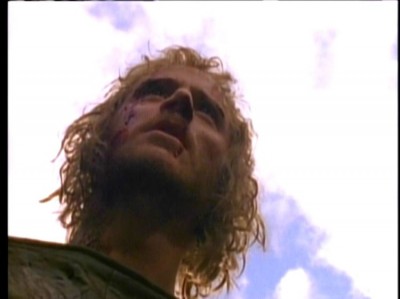
Normally, I try and restrict comparisons between various adaptations of works, hoping to take each version of a particular film on its own merits, but in the case of this 1997 version of the oft-told Sir Walter Scott tale, I can't help but compare it to the superior Hollywood version with Robert Taylor and Elizabeth Taylor. Yes, this newer version tries to be more faithful to the Scott's original, with an emphasis on grittier, more dark thematic elements of the story, but for my money, even though it was glamed up for the screen (and bowdlerized from the original), the Taylors version is the superior entertainment for the simple fact that it truly wanted to entertain. This Ivanhoe, however, doesn't seem to know what it wants to be. Supporting characters mouth off like leftovers from Richard Lester's The Three Musketeers, and the grimy production design seems to encourage that comic comparison.
However, we're then faced with an Ivanhoe, as essayed by stiff, grim Waddington, who's entirely humorless (and rather dull), and who fails to fill out the character to the epic proportions that are needed to suit this iconic tale. Is it a comedy or an action film or a romance? It's hard to say, because the tone is all over the place, and when we finally do get our bearings, we don't care because the individual sequences are so middling in design and execution. The action scenes (the tournament early in the story) are thoroughly familiar, so you can cross off "swashbuckler." And the romance scenes lack conviction between the three tentative leads. Which leaves us with political drama, I suppose, but even with the considerable heft of Christopher Lee as the malevolent leader of a Knights Templar sect, the political maneuvering of Ivanhoe comes off as generic and commonplace. It's a disappointing way to close out The Romance Collection: Special Edition.
The DVD:
The Video:
The video transfers for The Romance Collection: Special Edition aren't the greatest, unfortunately. Pride and Prejudice is presented in an anamorphically enhanced, 2.35:1 widescreen transfer that's head-and-shoulders above the other transfers here - but it's still not perfect, with jiggering apparent (possibly from PAL conversion issues), along with a disagreeable hotness to some of the daylight scenes. My understanding is that this film was shot on Super 16, and that may account for the decreased clarity compared to a 35mm widescreen image. All the other films in The Romance Collection: Special Edition set are presented full screen, and with some variation, they all look about as well as one would expect from video-sourced British TV productions. All the films were shot on film and then transferred to video, so I'm going to assume that any image problems stem from the transfers, not the original source materials. Grain and video noise are apparent in all the features, as well as minor pixilation in the darker scenes, and generally soft pictures (in comparison to newer films on DVD). Obviously, the smaller the monitor the better for these, but again, many of the viewers who enjoy these kinds of titles won't be sticklers for video fidelity, so the fair-to-middling image results aren't deal-breakers.
The Audio:
All of the films in The Romance Collection: Special Edition set are presented in Dolby Digital English 2.0 stereo mixes, which are adequate (if unspectacular) mixes for these dialogue-heavy dramas. Dialogue, for the most part, is cleanly delineated. Pride and Prejudice, Victoria & Albert, Emma, Jane Eyre, The Scarlet Pimpernel, and Lorna Doone all have subtitles and close-caption options; the other films do not.
The Extras:
Extras are light here for The Romance Collection: Special Edition set. There's a behind-the-scenes featurette from 1999, The Making of Pride and Prejudice, running 26:38, that gives a fairly good accounting of what went into producing this ambitious project. The rest of the few extras are strictly text in nature, with slim cast filmographies for Victoria & Albert, a Jane Austen bio for Emma, a Charlotte Bronte bio for Jane Eyre, and a Henry Fielding bio for The History of Tom Jones, A Foundling. That's it. Pretty slim pickings, considering the price of the set.
Final Thoughts:
Since all of these titles have been released before on DVD, and they sport no new transfers nor extras, double-dipping is unnecessary for owners of the older discs. However, those who crave British TV period romances will no doubt find The Romance Collection: Special Edition an overwhelmingly attractive package that they can't do without for their DVD libraries. I highly recommend (even with the iffy transfers and almost non-existent extras) The Romance Collection: Special Edition set.
Paul Mavis is an internationally published film and television historian, a member of the Online Film Critics Society, and the author of The Espionage Filmography.


|
| Popular Reviews |
| Sponsored Links |
|
|
| Sponsored Links |
|
|
| Release List | Reviews | Shop | Newsletter | Forum | DVD Giveaways | Blu-Ray | Advertise |
|
Copyright 2024 DVDTalk.com All Rights Reserved. Legal Info, Privacy Policy, Terms of Use,
Manage Preferences,
Your Privacy Choices | |||||||









